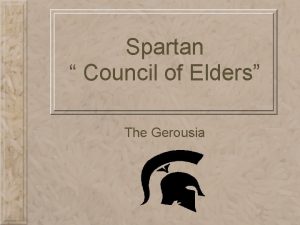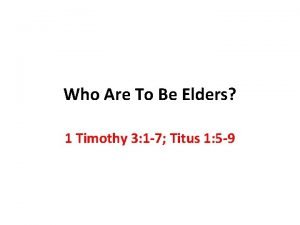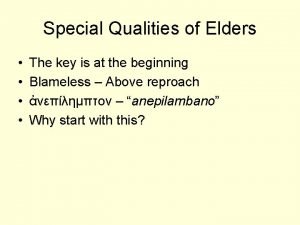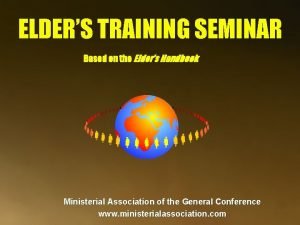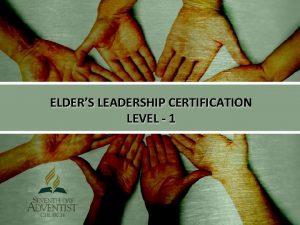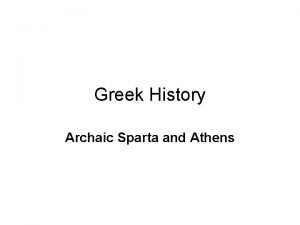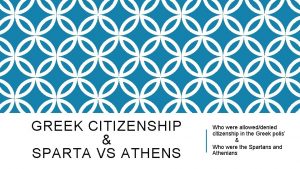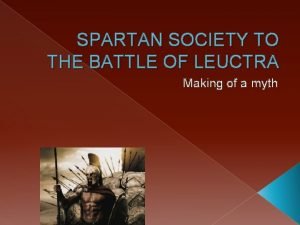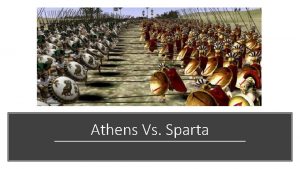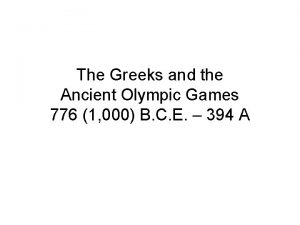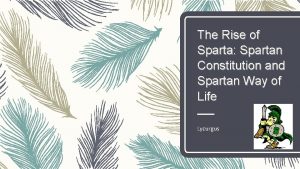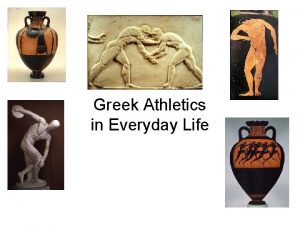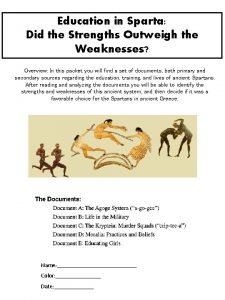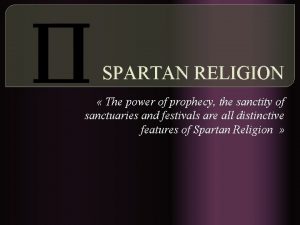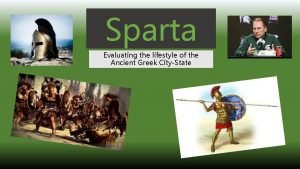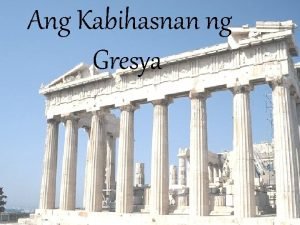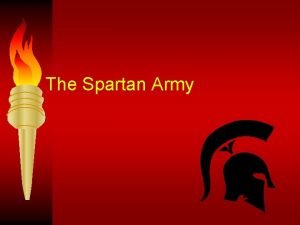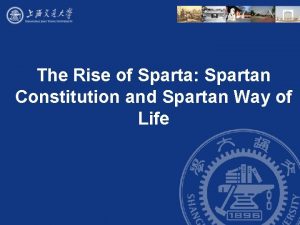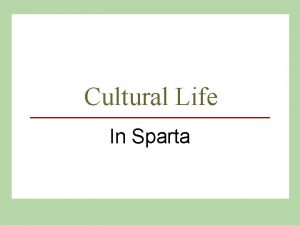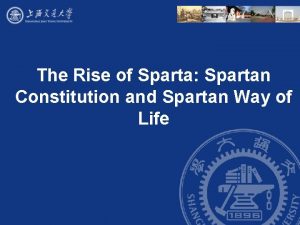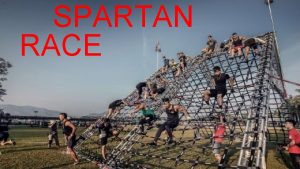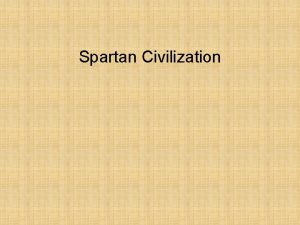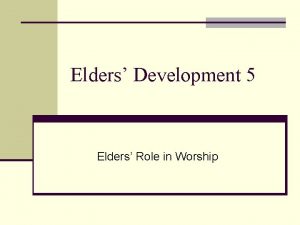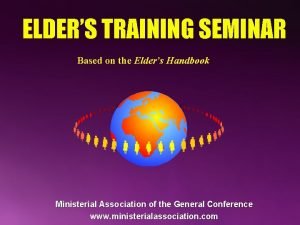Spartan Council of Elders The Gerousia Xenophon Lycurgus





















- Slides: 21

Spartan “ Council of Elders” The Gerousia

Xenophon • “Lycurgus also provided for the continual cultivation of virtues even to old age, by fixing the election to the council of elders as a last ordeal at the goal of life, thus making it impossible for a high standard of virtuous living to be disregarded even in old age. . Moreover he laid upon them, like some irresistible necessity, the obligation to cultivate the whole virtue of a citizen. Provided they duly perform the injunctions of the law, the city belonged to them each and all, in absolute possession, and on an equal footing. . “.

Polybius • “in each constitution there is naturally engendered a particular vice inseparable from it: in kingship it is absolutism; in aristocracy it is oligarchy; in democracy lawless ferocity and violence; and to these vicious states all these forms of government are, as I have lately shown, inevitably transformed. Lycurgus, I say, saw all this and accordingly combined together all the excellences and distinctive features of the best constitutions, that no part should become unduly predominant and be perverted into its kindred vice; and that, each power being checked by the others, no one part should turn the scale or decisively out-balance the others; but that, by being accurately adjusted and in exact equilibrium, the whole might remain long steady like a ship sailing close to the wind. The royal power was prevented from growing insolent by fear of the people, which had also assigned to it an adequate share in the constitution. The people in their turn were restrained from a bold contempt of the kings by fear of the Gerusia, the members of which, being selected on grounds of merit, were certain to throw their influence on the side of justice in every question that arose; and thus the party placed at a disadvantage by its conservative tendency was always strengthened and supported by the weight and influence of the Gerusia. The result of this combination has been that the Lacedaemonians retained their freedom for the longest period of any people with which we are acquainted. ”

Plutarch • “Amongst the many changes and alterations which Lycurgus made, the first and of greatest importance was the establishment of the senate, which having a power equal to the king's in matters of great consequence, and, as Plato expresses it, allaying and qualifying the fiery genius of the royal office, gave steadiness and safety to the commonwealth……. . found in this establishment of the senate a central weight, like ballast in a ship, which always kept things in a just equilibrium; the twenty-eight always adhering to the kings so far as to resist democracy, and on the other hand, supporting the people against the establishment of absolute monarchy. ”

Membership • There were 28 members plus the two kings • Membership was restricted to Spartans over 60 years of age who were no longer liable for military service • Members were elected by the Assembly. Aristotle mentions “ the best families”. Plutarch says that they have to be” the best and most deserving. ” • Selection was by acclamation( shouting and clapping). He was taken in procession around the city, attended a special banquet and honoured in verse and song. Aristotle describes this process as” childish”

Functions • The gerousia was a probouleutic body. This meant that they prepared and deliberated on bills to be presented to the Assembly for voting • If we accept the Rider as a later document, it established almost a veto power in that it could decline to accept the decision of the Assembly and adjourn proceedings. • The Gerousia, Kings and Ephors acted as a court of justice. They tried cases of murder and treason And imposed penalties ranging from death to banishment and fines

Modern Historians • “It would take a brave and confident king to pursue a policy that did not command the support of the majority of the Gerousia, knowing that in the event of failure, he was likely to be prosecuted upon his return. ” Buckley ( see G E M De Ste Croix ) • “ Even the kings whose position was more exalted than of other citizens, were tried before the Gerousia and ephors…the Gerousia was the highest lawcourt in Sparta, the only court that could inflict the graver penalties of deat, exile or loss of civil rights. ” Andrews

Ste Croix • “ Any Spartan, even a king, might be influenced in his course of action by the knowledge that he was likely to be prosecuted if he pursued an unsuccessful policy, in opposition to the wishes of the faction then dominant in the Gerousia. . Xenophon tells us when King Cleombrotus was leading the army in Boeotia, and his friends told him that if he let the Thebans escape without a battle, he would be “ in danger of suffering the extreme penalty at the hands of the city. ”And his enemies commented that this time Cleombrotus would really show whether the rumour of his partiality for the Thebans was true or not. The result was that Cleombrotus, who would have been well aware of the personal influence on many gerontes of the passionately anti Theban King Agesilaus, was prompted to join battle, perhaps against his better judgement. ”

Dynamism in Spartan Government • “Despite the mirage of the stable , balanced and harmonious government many ancients speak of, it is clear from the anecdotal evidence that the interaction of the three elements varied over time, depending on such factors as external events , factions, and personal prestige. ” Your beloved leader

Aristotle • “Again, the council of elders is not free from defects. It may be said that the elders are good men and well trained in manly virtue; and that, therefore, there is an advantage to the state in having them. But that judges of important causes should hold office for life is a disputable thing, for the mind grows old as well as the body. . . Many of the elders are well known to have taken bribes and to have been guilty of partiality in public affairs. And therefore they ought not to be irresponsible; yet at Sparta they are so. But (it may be replied), 'All magistracies are accountable to the Ephors. ' Yes, but this prerogative is too great for them, and we maintain that the control should be exercised in some other manner. Further, the mode in which the Spartans elect their elders is childish; and it is improper that the person to be elected should canvass for the office; the worthiest should be appointed, whether he chooses or not. And here the legislator clearly indicates the same intention which appears in other parts of his constitution; he would have his citizens ambitious, and he has reckoned upon this quality in the election of the elders; for no one would ask to be elected if he were not “

The Spartan Assembly “ A collection of warrior citizens, to settle questions of great moment. ” Michel

Criteria for Membership 1. Had to be born of two Spartiate parents 2. Pass the examination by Elders at Birth 3. Had to pass all stages of the Agoge 4. Had to be a member of a syssition 5. Male over the age of 30 years

Excluded from Membership 1. Perioicoi 2. Inferiors 3. Helots 4. Women

Roles and Responsibilities • • • Questions of War and Peace Signing of Treaties Election of Gerousia and Ephors Issues of disputed Succession Freeing of helots

Process of Decision Making “ After them the commoners Shall make response to direct proposals With conscientious speech and all just consequence, Making no twisted plans against our realm And commoner’s majority shall win the day” Tyrtaeus “ But the people must have the ultimate authority and power…( rider ) But if the people shall speak crookedly, the elders and founder chiefs are not to ratify the motion, but must refuse to do this and they are to dismiss the people for perverting and changing the motion contrary to what is best. ” Plutarch

Problems of Evidence • On the vast majority of cases when the Spartan state took action, historians do not specify the authority which ordered the action, but simply say that “the Spartans decided that…. ”

Process • The Assembly met once a month at the full moon, in the open air “appelaze between Babyka and Knakion” under the chairmanship of the Ephors • Pausanius speaks of a Parliament house called the Skias, or canopy where the Spartans hold their meetings, “ This canopy they say was made by Theodorus of Samos”. It may be likely that the shade area was for the Elders or Ephors rather than the whole Assembly • The system was probouletic, in that resolutions were discussed by the Gerousia and Ephors and then presented to the Assembly • Voting was by acclamation

Historic Decisions • Xenophon tells us of the conspiracy of Cinadon in the first year of Agesilaos’ reign. The conspiracy was reported to the Ephors; ” they did not even summon what is called the little Assembly but collected the gerontes from wherever each one happened to be, and their joint decision was to send Cinadon oit of town and arrest him quietly at Aulon • Thucydides gives us a record of the debate in 432 on whether to go to war with Athens. It seems to exclude the Gerousia in any serious consideration. The Spartans “ held their usual assembly” which was addressed both by their allies and by an Athenian delegation; then all foreigners were removed while they debated among themselves and at the end a formal vote was taken. “ After this speech, Sthenelaidas, himself as Ephor, put the question to the Spartan Assembly. They actually make their decisions by shouting and not by voting, and he said that he could not distinguish which acclamation was louder, because he wanted them to show their opinion clearly and thus be all the more eager for war…” Thucydides •

Limitations to Power • Public voting could be manipulated and result in intimidation. Acclamation did not rest on one man one vote. • If the decision was crooked the Ephors could withdraw the resolution and allow it to lapse. The Assembly could not amend the resolutions.

Historian’s Views • “The Assembly included everyone, but it seemed to have been a rather passive role. It could never initiate action nor amend proposals. It could only approve or reject and one may wonder how much independence of judgment was exercised by a body of men for whom strict military obedience was the paramount virtue. ” Finlay • “ The fact that it met so constantly gave it considerable power and the acts of the Ephors were always under review. ” Michel

Understanding • Create a visual representation of Spartan Government. Your image must reflect understanding of roles and responsibilities, power structure, limitations and other factors such as prestige that may affect the relationship between the three elements.
 Sparta council of elders
Sparta council of elders Lycurgus cup
Lycurgus cup Xenophon ekonomiks
Xenophon ekonomiks Qualifications for elders 1 timothy
Qualifications for elders 1 timothy Bronson intranet
Bronson intranet Qualities of an elder
Qualities of an elder Church elders training
Church elders training Elders housing preferences reflect a strong desire for
Elders housing preferences reflect a strong desire for Certificate for church elders
Certificate for church elders Revelation chapter 4
Revelation chapter 4 Perioikoi
Perioikoi Sparta citizenship
Sparta citizenship Spartan society to the battle of leuctra
Spartan society to the battle of leuctra Athens vs sparta
Athens vs sparta Spartan time period
Spartan time period Spartan constitution
Spartan constitution What spartan values are suggested by this document
What spartan values are suggested by this document Spartan women
Spartan women Strengths of sparta
Strengths of sparta Sparta religion
Sparta religion Periocei
Periocei Ang pamayanan ng sinaunang gresya
Ang pamayanan ng sinaunang gresya
